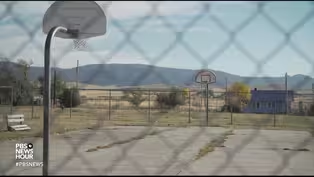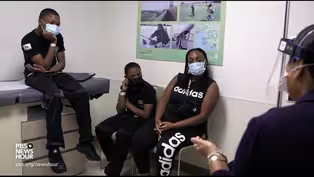
Invisible Scars | Part 3
Special | 10m 21sVideo has Closed Captions
The overwhelming impact of childhood trauma on Chicago's West Side
PBS NewsHour explores America's childhood trauma crisis
Problems playing video? | Closed Captioning Feedback
Problems playing video? | Closed Captioning Feedback
Major corporate funding for the PBS News Hour is provided by BDO, BNSF, Consumer Cellular, American Cruise Lines, and Raymond James. Funding for the PBS NewsHour Weekend is provided by...

Invisible Scars | Part 3
Special | 10m 21sVideo has Closed Captions
PBS NewsHour explores America's childhood trauma crisis
Problems playing video? | Closed Captioning Feedback
How to Watch PBS News Hour
PBS News Hour is available to stream on pbs.org and the free PBS App, available on iPhone, Apple TV, Android TV, Android smartphones, Amazon Fire TV, Amazon Fire Tablet, Roku, Samsung Smart TV, and Vizio.
Providing Support for PBS.org
Learn Moreabout PBS online sponsorshipMore from This Collection
Invisible Scars: America’s Childhood Trauma Crisis
Video has Closed Captions
Breaking the cycle of childhood trauma in rural Montana (10m 1s)
Video has Closed Captions
Childhood trauma impacts millions of Americans, and it’s having devastating consequences (10m 11s)
Providing Support for PBS.org
Learn Moreabout PBS online sponsorshipJUDY WOODRUFF: We return now to our in-depth look this week at the issue of childhood trauma.
We know every child in this country has a chance of experiencing something traumatic, but many sources of trauma happen more often in communities of color.
Tonight, special correspondent Cat Wise and producer Sam Lane explore that inequality in Chicago.
It's part of our series Invisible Scars: America's Childhood Trauma Crisis.
CAT WISE: The near constant wail of sirens, colorless, boarded-up buildings, vacant lots littered with trash.
In parts of America's third-largest city, a simple walk down the street can be unnerving.
It's difficult to fully capture the scope of trauma in a city like Chicago, where gun violence, poverty and other factors create a toxic living environment for many families.
One area disproportionately impacted by the sources of that trauma is in the Austin neighborhood on the city's West Side.
The predominantly Black neighborhood is one of Chicago's biggest and most violent.
MAN: A 3-year-old boy is dead after a shooting in South Austin.
CAT WISE: It saw 53 homicides last year, more than any other community in the city.
Tens of thousands of young people grow up in and around Austin, including Tia Ford, Jawonn Nix and Omarion James.
Each has had at least one family member die from gun violence.
Omarion's 13-year-old sister was killed in June when a bullet entered his family's home.
OMARION JAMES, Chicago: When that happened, I just didn't feel safe at all no more in my neighborhood.
I'm always looking over my shoulders.
TIA FORD, Chicago: People are just getting killed in my community.
Like, I know it could be me at a certain time.
JAWONN NIX, Chicago: People get traumatized after seeing what they see going on in the neighborhood.
CAT WISE: Austin exemplifies childhood trauma's uneven impact in the U.S. it's one of countless communities where experts say disinvestment and systemic racism are at the root of many adverse childhood experiences, or ACEs, those events during childhood that are potentially traumatic.
Across America, Black children are nearly twice as likely to have three or more ACEs than white children.
CYNTHIA WILLIAMS, Austin Peoples Action Center: We had more activities burying babies and children than we had taking them to the zoo.
CAT WISE: Cynthia Williams leads the Austin Peoples Action Center, which, among other services, finds jobs for teens like Omarion, Tia and Jawonn.
They help around the center's office and with youth programming and work at local businesses.
Williams says the jobs can keep them off the street and away from sources of trauma, like gun violence.
CYNTHIA WILLIAMS: All the violence that's going on in a community, I believe is because of lack of jobs, the lack of resources, adequate housing, adequate food.
So, a lot just don't feel that they get their fair share.
CAT WISE: Austin's median household income is less than $34,000.
But literally blocks away, in the Chicago suburb of Oak Park, things are different.
It's mostly white, has a median household income over $90,000, and didn't see a single murder last year.
Tia goes to high school in Oak Park.
TIA FORD: When me and my friends go back to Oak Park, we feel safe.
CAT WISE: How does that make you feel, the differences between the two communities?
TIA FORD: Sad, because I want Chicago to be in the same situation Oak Park is in.
DONALD DEW, Habilitative Systems, Inc.: It's a very different environmental experience growing up in Chicago vs. Oak Park.
CAT WISE: Donald Dew spent part of his childhood in Austin.
His most vivid memories include a bullet flying near his head and a police officer forcing him to the ground.
Dew is now the head of Habilitative Systems, a West Side nonprofit that works with disadvantaged residents.
DONALD DEW: Our children are experiencing victimization on multiple levels.
And then they have to deal with this mentally.
They have to deal with it physically.
They have to deal with it emotionally.
What do you do with all these emotions?
What do you do with this anger?
What do you do with this confusion and this conflict?
You know, fundamentally, our children are experiencing another level of pain.
CAT WISE: And 2020 has done little to close the inequality gap.
Chicago saw a disproportionate spike this year in suicide deaths among its young Black residents.
And following months of unrest over racism in the U.S., the teens we met in Austin say it's a painful issue they often confront.
Is racism one of the traumas that young people can go through this community?
TIA FORD: Yes, especially in my school.
We go through racism all the time.
JAWONN NIX: Yes, the police, they be -- I got dreads.
They be stereotyping me.
They don't even be knowing.
They just go based off of how I look.
CAT WISE: In Chicago, like the rest of the country, people of color are vastly overrepresented in the criminal justice system, which means there are a lot of Black and brown kids with a parent in jail.
It can be a devastating adverse childhood experience that clinical psychologist Nneka Jones Tapia knows all too well.
She was just 8 years old when her father was arrested.
DR. NNEKA JONES TAPIA, Clinical Psychologist: I just remember them searching our whole house and patting my dad down in front of me, and him turning around as he was being patted down and looking at me as I was sitting on the couch, and just telling me everything was going to be OK. CAT WISE: Looking back now, do you view that as a traumatic event in your childhood?
DR. NNEKA JONES TAPIA: Of course.
You know, I'm tearing up now, 42 years old, talking about it.
CAT WISE: In 2015, Tapia became the warden of the Cook County jail, one of the largest in the country.
DR. NNEKA JONES TAPIA: When you look at the men and women who are entering into correctional facilities, you also see overwhelming impact of trauma.
CAT WISE: Now Tapia works for Chicago Beyond, which funds youth-centered programs and research in the city.
She's an expert on the inequality of childhood trauma.
DR. NNEKA JONES TAPIA: We are all at risk of being exposed to trauma.
We all are.
But when we disinvest in communities, when there are inadequate educational systems in communities, health disparities in communities, the problem with violence in communities, then we are increasing the risk of childhood trauma.
And that is happening predominantly in Black and brown neighborhoods.
CAT WISE: Samantha Nieto is a Chicago public school counselor.
She says the city's schools are like triage centers for trauma, and estimates 80 percent of her students have faced a traumatic event or have a relative who has.
SAMANTHA NIETO, Chicago Public Schools Counselor: I kind of get called in to talk to these students about why they walked out of the classroom or why they were disrespectful to their teacher or why they got into a fight with another student.
And when I have those conversations, it turns out they're stressed out because they witnessed their parents fighting in the home, or they witnessed a sibling in gun violence, or they haven't had a real meal in several days.
CAT WISE: Nieto is the only counselor for 600 students, more than double the recommended ratio.
SAMANTHA NIETO: The way that I can kind of try to reach these children is by going into their classrooms and trying to do more preventative and proactive approaches by teaching them how to deal with these life stressors, as opposed to being more reactionary and trying to put a Band-Aid over the issue after they happen.
CAT WISE: So, for example, when students face situations that can trigger anger, she teaches them to remain calm by focusing on their five senses, naming specific things they can see, touch, hear, smell, and taste in that moment.
For students who feel insecure or who tend to magnify their own mistakes, she tells them to write down their perceived shortcomings before crumpling up the paper and throwing it away.
But, importantly, Nieto tries to speak honestly with her students, saying their feelings are normal, often acknowledging some of the injustice in their lives.
And for many Chicago kids, part of that injustice is a lack of access to mental health care.
LORI LIGHTFOOT, Mayor of Chicago, Illinois: Our mental health system has significant gaps.
CAT WISE: In October, the city did announce $8 million in grants for organizations on the South and West Sides.
The money will go in part to hire more mental health professionals.
Matt Richards Is A Deputy Commissioner At The Chicago Department Of Public Health.
MATTHEW RICHARDS, Deputy Commissioner, Chicago Department of Public Health: There are particular parts of the country where the social safety net being frayed impacts people's health more than others.
As a city, we can use our resources to the best that we can to invest.
But we really need a national strategy that recognizes that, when the conditions in people's lives make them feel unsafe, make them worried, on edge, it has all these downstream impacts.
CAT WISE: Impacts that young people like the ones we met in Austin feel daily.
Since his sister's death, Omarion James has sought new ways to cope with his trauma.
OMARION JAMES: The person I am, usually, I don't open up, but, like since this happened, I try to open up, because I know there's other people out there that's going through the same thing.
So, I try to open up and let people know my pain, and I know they are probably feeling the same thing.
CAT WISE: But each day can bring new pain.
After we met Omarion, his 18-year-old brother was also shot and killed.
On Facebook, he wrote that his whole soul had been taken.
For the "PBS NewsHour," I'm Cat Wise in Chicago.
JUDY WOODRUFF: So hard to even imagine losing two siblings.
Thank you, Cat Wise, for that report, and Sam Lane.
And online tomorrow at 1:00 p.m. Eastern, join William Brangham for a live chat with an expert on child development, who will take your questions about childhood trauma, the pandemic and resilience.
You can find that on our Web site, PBS.org/NewsHour.

- News and Public Affairs

FRONTLINE is investigative journalism that questions, explains and changes our world.

- News and Public Affairs

Amanpour and Company features conversations with leaders and decision makers.












Support for PBS provided by:
Major corporate funding for the PBS News Hour is provided by BDO, BNSF, Consumer Cellular, American Cruise Lines, and Raymond James. Funding for the PBS NewsHour Weekend is provided by...

